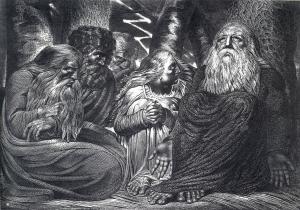 Well over one-half of the Book of Job is given over to the 3-cycle dialogue between Job and his three “friends.” With friends like those, no one needs enemies. The first two of those dialogues follow the same pattern: Job speaks, Eliphaz speaks, Job, Bildad, Job, Zophar, Job (chapters 3-14; 15-21). However, the third cycle is badly disrupted; exactly why has never been completely understood, but the fact is after Eliphaz’ speech that begins the cycle, and after Job’s reply in chapters 23-24, things go awry. The speech of Bildad in chapter 25 is only 5 verses long, while Job’s supposed answer in chapters 26-27 often sound more like a speech of the friends than a Joban address. Zophar has no third speech at all. Though many scholars have attempted to reconstruct the third cycle out of the existing fragments (the Jerusalem Bible even goes so far as to put in their translation a reconstructed text, an operation I find frankly absurd), we may only conclude from what we have that the friends, one by one, are vanquished by Job, and leave the scene humiliated and shown for the cruel idiots they are.
Well over one-half of the Book of Job is given over to the 3-cycle dialogue between Job and his three “friends.” With friends like those, no one needs enemies. The first two of those dialogues follow the same pattern: Job speaks, Eliphaz speaks, Job, Bildad, Job, Zophar, Job (chapters 3-14; 15-21). However, the third cycle is badly disrupted; exactly why has never been completely understood, but the fact is after Eliphaz’ speech that begins the cycle, and after Job’s reply in chapters 23-24, things go awry. The speech of Bildad in chapter 25 is only 5 verses long, while Job’s supposed answer in chapters 26-27 often sound more like a speech of the friends than a Joban address. Zophar has no third speech at all. Though many scholars have attempted to reconstruct the third cycle out of the existing fragments (the Jerusalem Bible even goes so far as to put in their translation a reconstructed text, an operation I find frankly absurd), we may only conclude from what we have that the friends, one by one, are vanquished by Job, and leave the scene humiliated and shown for the cruel idiots they are.
Eliphaz is his final speech gives the game to Job quite directly, when he announces, astonishingly, the following morsel of “wisdom”: “Can a warrior be of use to God? Can even the wisest be of any profit to God? Is it any pleasure to Shaddai that you are righteous; does God gain anything if you make your actions blameless” (Job 22:2-3)? In other words, Eliphaz’ central idea, namely that God rewards the righteous and punishes the wicked, is here completely undercut by his notion that God cares nothing for righteousness and wickedness whatever! Though he gabbles on with his usual foolishness in the succeeding verses of the speech, his argument is over, and Job has won. Eliphaz limps from the stage, perhaps followed by the jeers of the audience along with a rotten piece of fruit or two. Bildad’s last speech is ridiculously short, concluding with the uplifting lines that in the sight of the great God, humans are only “maggots and worms” (Job 25:6). We can be grateful that there is no third speech of Zophar, a speech no doubt that would have proven his emptiness all too clearly. The friends’ theological claims are shown to be devoid of truth, monstrous in the face of the sufferer. Only Job remains on the stage, proudly shouting, “I hold tight to my righteousness, and will not let go; my heart does not reproach me for any of my days” (Job 27:6). In other words, Job is ready to meet his God in order to discover what has gone wrong in the moral order of the universe, an order that demands rewards for Job’s exemplary behavior, but has instead produced grievous loss. The fact is that Job has all along believed exactly what his friends believed—God rewards and punishes. The problem is that in Job’s case, the order has failed, and since Job is ultimately righteous, the problem must lie with God.
And in Job 29-31, Job summarizes the drama. He first says he wishes things were as they once were, “when God watched over him” (Job 29:2), but now (Job 30:1) he has become a laughingstock among those “younger than he,” boys “whose fathers he would not have given the charge of his dogs.” Finally, he provides a lengthy “oath of clearance,” suggesting that if he ever actually had done any foul deeds, he calls down terrible curses on himself. “Does not calamity befall the unrighteous and disaster the workers of iniquity” (Job 31:3)? Why then should Job, who is far from unrighteousness and iniquity, be attacked in these terrible ways by God? It is unfair, monstrous, repulsive, and God is clearly the problem! He concludes with a titanic demand that God come and answer his cries for justice: “If only I had one to hear me; if only I had the indictment written by my adversary! …I would give God an accounting of all my steps; like a prince I would approach God” (Job 31:35, 37)! Surely, God will now show up and answer!
But no! First we hear six long and rather dreary chapters from a fourth friend of Job named Elihu. It is a lengthy and frankly painful interruption in the ongoing march of the drama. Elihu adds exactly nothing to the story, repeating in effect what the other friends have already said in better poetry. It takes young Elihu fully 24 verses simply to introduce himself, announcing along the way that he is “full of words,” and “like a new wineskin is ready to burst” (Job 32:18-19). No one will deny that truth after sitting through the prattle of this unwelcome intruder. I would suggest that Elihu is something like comic interlude, particularly toward the end of his seemingly endless oration, when he grandly announces, “God does not pay attention to any who are wise in their own conceit,” and of course in that jibe he is referring to Job. But the joke is on Elihu, and perhaps on his three friends as well, since the next voice we hear is no one but YHWH, appearing in a thunderstorm to speak to Job, as Job has demanded for many chapters. What YHWH says is specifically called an “answer” to Job, but the answer is most unexpected in content and completely changes the focus of the drama.
“Who is this who obscures my design with words without knowledge? Gird up your loins like a warrior; I will question you, and you will declare to me” (Job 38:2-3). The very first words out of the mouth of YHWH announces sharply that the previous dialogues between Job and his friends have done little save “obscure the design of God.” In other words, we learn immediately that YHWH’s way in the world has exactly nothing to do with what Job and his friends have been taught and continue to imagine. The rewarding and punishing God simply does not exist, and Job did well by asking for his killing in 19:25. Readers of these enormous speeches from YHWH have termed them designed to in effect “shut Job up,” to put him in his only human place, to set God back on the throne of the universe. I of course agree that is one of the points of the speeches of God; Job is not God, and he needs reminding of that fact. But surely the author does not need 76 verses to tell Job to shut up! There is much more in these fabulous addresses— and great poetry they clearly are—and among that “more” is a new way to envision God and our place in the whole universe of God.
Readers of the speeches of YHWH have too quickly summarized them and not paid careful enough attention to some of the details of the language. It is easy to conclude that YHWH first directs Job’s attention to the God-induced and controlled weather patterns of the world (Job 38:4-38), followed by a lengthy zoological parade (Job 38:39- 39:30). However, two conclusions may be drawn from all these words once a closer look at some of them is made. Job 38:25-27 appears on the surface to be simply another example of YHWH’s mastery over the rain, but there is more.
“Who cuts a path for the thunderstorm, carves a road for the rain
to water a desolate place,
a place without humans;
to make the desolate place blossom
and fill the desert with grass?
The crucial note here is that YHWH’s actions with the rain sometimes occurs without the existence of any human beings; no human ever sees those times when rain falls on desert places and makes the wasteland bloom and sprout grass. In short, we humans are not always the center of God’s gifted action in the world. We are a part of God’s grand universe, but we are not the center of it. Job needed to learn that truth, and so do we. I suggest that here is a direct repudiation of Gen. 1:26-28, where human beings are given “dominion” over all living things. Not so, says YHWH to Job! The actions of God in the world are not always about us human beings.
This important truth is emphasized in another way by YHWH’s long catalogue of the numerous ways that YHWH cares for the myriad living creatures of the world. Note carefully just who the creatures named are and who they are not. Each one named is a wild animal, untamed and uncontrolled by any human; even the horse mentioned in 39:19-25 is hardly the tamed animals of the local ranch; it is the battle horse, rearing and leaping (Job 39:20-21), filled with “fierceness and rage” (Job 39:24), speaking its near human “Aha!” when it smells the battle and hears the soldiers’ shouts (Job 39:25). Like the hawk and the eagle, the wild mountain goat and the wild ass, the wild ox and the ostrich, and the lion, all these wild creatures are fed and nurtured by YHWH, and humans have exactly nothing to do with any of it. The world of YHWH is a wild, exciting, gritty, harsh place, certainly “red in tooth and claw,” as Tennyson so famously said. This is not the mechanical, reward and punishment world of Job and his friends; this is the world of YHWH, and it is not at all an easy or comfortable spot.
But Job cannot hear what YHWH has said in this first divine speech; Job wants his own justice from God, not talk of the world’s wildness. So he replies with a furious sarcasm: “Look, I am tiny; what can I answer you?” (Like a defeated enemy) I lay my hand on my mouth. I have spoken once; that is enough; twice but no more” (Job 40:4-5)! YHWH’s vast display of weather and animals, designed to teach Job his need for humility and YHWH’s mastery of the wildness of things, is a lesson Job cannot hear. So, YHWH tries again.
At the start of the second speech, YHWH challenges Job again, as in the first address, but an important addition is made. YHWH asks, “Will you even put me in the wrong? Will you condemn me that you may be justified” (Job 40:8)? YHWH has been listening to Job after all, because that is exactly what Job has been saying from the start of the drama; either Job is wrong and YHWH is right, or YHWH is wrong and Job is right. For Job, the universe is a zero-sum game. Now YHWH will show Job that is not the only way that the universe can be construed.
YHWH opens the throne room of heaven a crack, and out lumber two mythological beasts, Behemoth and Leviathan. They may both be found in Canaanite texts, and are not to be envisioned as any kind of earthly creatures. Their descriptions are plainly otherworldly. But what is centrally important about them may be found in Job 40:15. “Look at Behemoth, which I made just as I made you.” Behemoth in the mythology of Israel’s neighbors, the Canaanites, was the great creature of the land, who lived under the ground; whenever he arched his huge back, there was an earthquake. In the same way, Leviathan was the twisting serpent of the sea, on occasion rising up from the ocean depths to threaten sailors. Neither of these beasts was to be trifled with, but it is crucial to note that they are also creations of YHWH just as Job is. Hence, they are part of God’s world, too, and dangerous and untamable as they are, YHWH finds in them an inevitable part of the world YHWH created. That world is rife with lions, eagles, ravens, Behemoth, and Leviathan, and is thus not a simple quiet, comfortable, easily understandable world in which to live. Our planet, as Bill McKibben has so eloquently said, “is a buzzing, weird, stoic, abundant, reckless, haunting, painful, perfect planet. All of it matters; all of it is glorious.” (McKibben, The Comforting Whirlwind, 73).
And now Job gets it. “I had heard of you by the hearing of the ear, but now my eye sees you; therefore I reject (what I said), and change my mind on dust and ashes” (Job 42:5-6). The NRSV’s translation “I despise myself and repent” is frankly ridiculous and should be avoided and rejected completely. Job rejects not himself but his unknowing words in dialogue, and then changes his mind about the ways he has conceived the universe of YHWH, knowing now that he is finally dust and ashes, a part of YHWH’s world but hardly the only important part of it.
The epilogue (Job 42:7-17) has been seen as a huge problem for the central claim of the long drama, but it need not be. Job receives double from God what he had lost all right, but that is not because of anything he did, but is simply a gift of YHWH. The translation of 42:10 is the key. “YHWH restored the fortunes of Job and (not NRSV’s “when”) Job prayed for his friends.” YHWH’s gift to Job is followed by Job’s magnanimous reception of his terrible friends who now are a part of Job’s new community. Also, his daughters receive both names and property, highly unusual facts in a patriarchal world, but facts that show how new this world of Job really is.
The loss of this Job in the church is indeed tragic. To see God in this way, and to see ourselves in right relationship to that God and to God’s wild world is so important in our time of environmental disaster. The planet was not made and sustained for us alone; it is the place of God’s amazing abundance and untamable wildness, not a vast storehouse of human goodies to be plundered and exploited freely and endlessly. This is the world we must envision now before the cupboards become bare and the planet heats up to its violent destruction. That is the Job drama we have lost. May he be found again for all of us!











